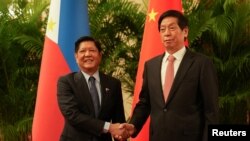ປະທານາທິບໍດີຟິລິບປິນ ທ່ານເຟິດີນັນ ມາໂກສ ໄດ້ກ່າວໃນວັນພຸດວານນີ້ວ່າ ທ່ານຫວັງທີ່ຈະຂະຫຍາຍສາຍສຳພັນໃຫ້ແໜ້ນແຟ້ນກັບປັກກິ່ງ ໃນການເດີນທາງໄປຢ້ຽມຢາມເທື່ອທຳອິດຢ່າງເປັນທາງການ ນັບແຕ່ໄດ້ເຂົ້າຮັບຕຳແໜ່ງ ອີງຕາມລາຍງານຂອງອົງການຂ່າວຝຣັ່ງ AFP.
ຈີນ ແລະຟິລິບປີນ ພວມເກີດການຂັດແຍ້ງກ່ຽວກັບການໂຕ້ຖຽງທີ່ຝົດເດືອດຢູ່ທະເລຈີນໃຕ້ ໂດຍທີ່ທ່ານມາໂກສ ຄາດວ່າ ຈະເຊັນຂໍ້ຕົກລົງກັບປັກກິ່ງໃນອາທິດນີ້ ເພື່ອສ້າງຕັ້ງການສື່ສານໂດຍກົງກ່ຽວກັບບັນຫາທາງທະເລ.
ມະນີລາພິຈາລະນາວ່າ “ທີ່ເປັນສິ່ງສຳຄັນຕົ້ນຕໍ ເພື່ອຈະເສີມຂະຫຍາຍຄວາມສຳພັນລະຫວ່າງຈີນ ແລະຟິລິບປິນ” ທ່ານມາໂກສ ໄດ້ກ່າວຢູ່ໃນກອງປະຊຸມໃນວັນພຸດວານນີ້ ກັບສະມາຊິກສະພານິຕິບັນຢັດສູງສຸດ ທ່ານລີ ຊານຈູ.
ທ່ານມາໂກສ ຜູ້ທີ່ຄາດວ່າຈະພົບປະກັບ ປະທານປະເທດຈີນ ທ່ານສີ ຈິ້ນຜິງ ໂດຍກ່າວວ່າ ທ່ານຫວັງທີ່ຈະ “ເປັນເພື່ອນຮ່ວມງານທີ່ຈະສ້າງຄວາມທຸ່ນທ່ຽງ ແລະເສີມຂະຫຍາຍເສດຖະກິດຂອງພວກເຮົາທັງໝົດ.”
ມີຫຼາຍເຖິງ 14 ຂໍ້ຕົກລົງສອງຝ່າຍ ທີ່ຄາດວ່າຈະເຊັນ ໃນລະຫວ່າງການຢ້ຽມຢາມຂອງທ່ານມາໂກສ ທີ່ຈະເສັດສິ້ນ ໃນວັນພະຫັດມື້ນີ້.
ລັດຖະບານຟິລິບປີນໄດ້ກ່າວວ່າ ໃນອາທິດແລ້ວນີ້ ທັງສອງຝ່າຍ ຈະເຊັນຂໍ້ຕົກລົງສື່ສານຄົມມະນາຄົມເພື່ອ “ຫລີກລ່ຽງການຄາດຄະເນທີ່ຜິດພາດ ແລະການສື່ສານຢູ່ທະເລຕາເວັນຕົກຂອງຟິລິບປີນ” ຊຶ່ງໝາຍເຖິງພາກສ່ວນນຶ່ງຂອງທະເລຈີນໃຕ້ທີ່ຟີລິບປິນອ້າງເອົາກຳມະສິດ.
Philippine President Ferdinand Marcos said Wednesday he hoped to strengthen ties with Beijing on his first state visit to China since taking office.
China and the Philippines are at odds over the hotly disputed South China Sea, with Marcos expected to sign a deal in Beijing this week to establish direct communication on maritime issues.
Manila considers it "of primary importance to... strengthen the relationship between China and the Philippines", Marcos said in a meeting on Wednesday with top Chinese legislator Li Zhanshu.
Marcos, who is also expected to meet Chinese President Xi Jinping, said he hoped for "partnerships that will stabilize and strengthen all of our economies".
Up to 14 bilateral agreements are expected to be signed during Marcos's visit, which ends on Thursday.
The Philippine government said last week both sides would sign a communication agreement to "avoid miscalculation and miscommunication in the West Philippine Sea", referring to the part of the South China Sea that it claims.





